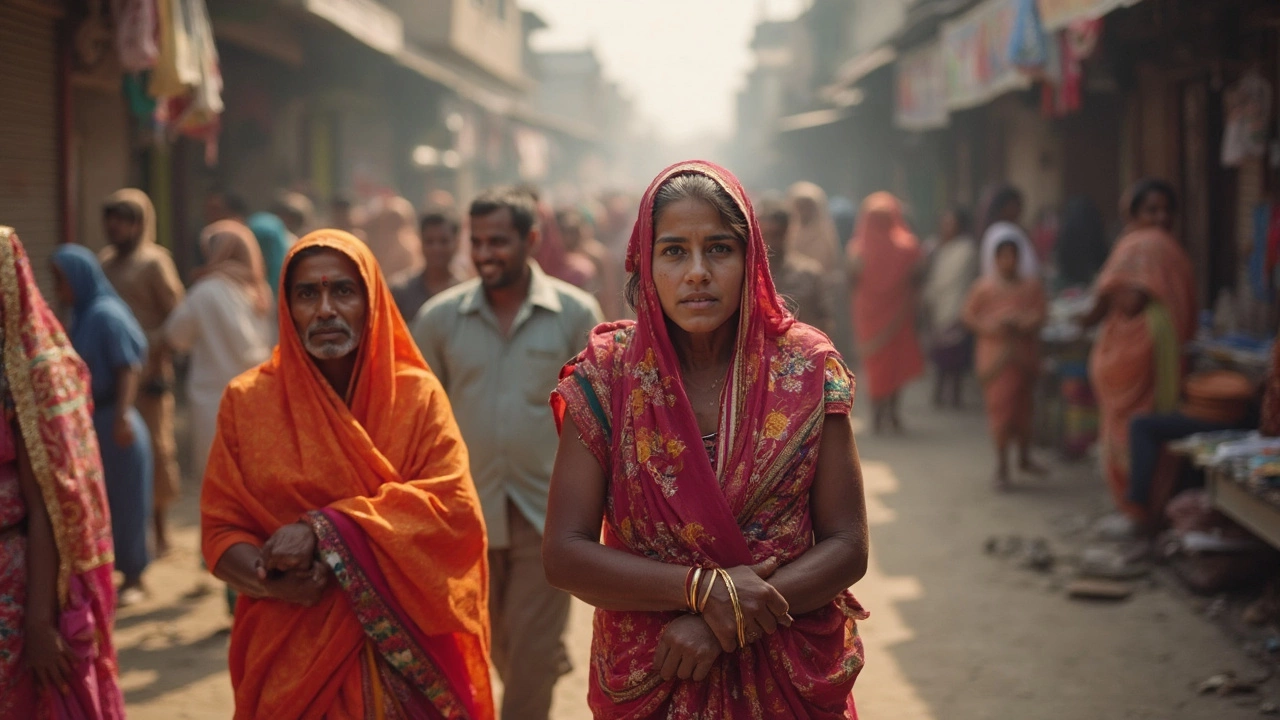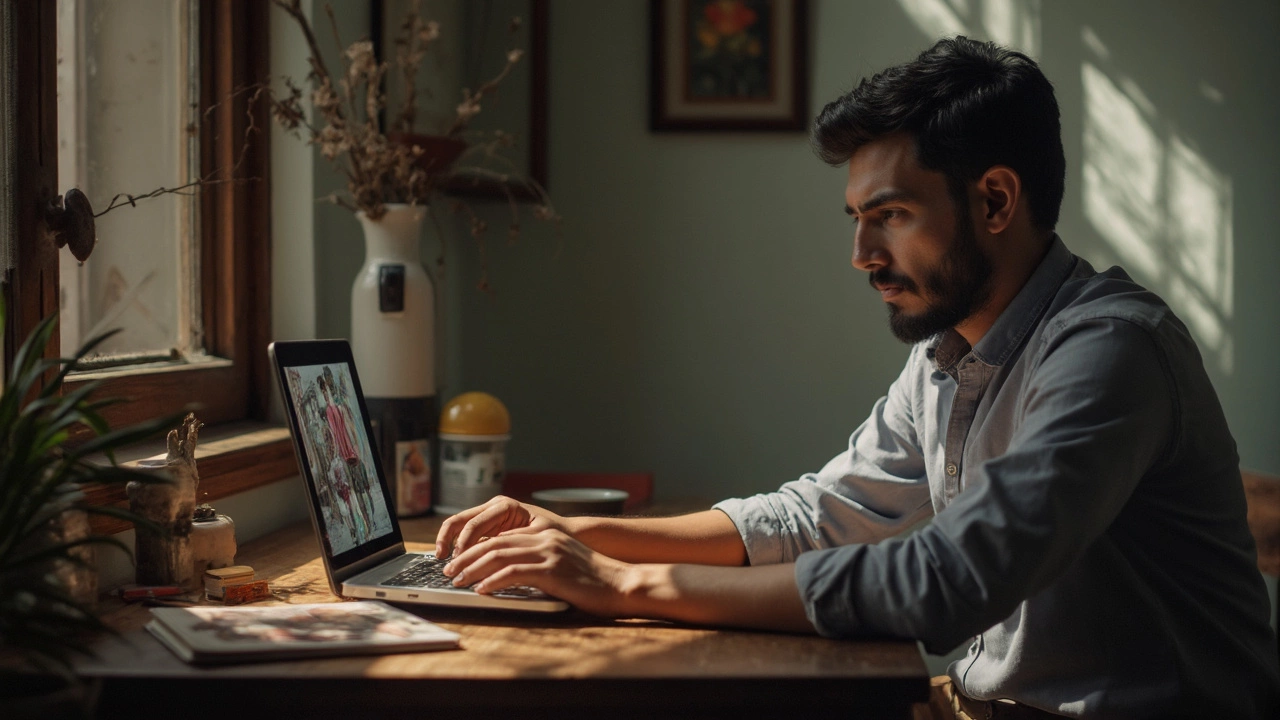What Photos Can I Not Sell? Candid Photography Rules in India
 Jun, 21 2025
Jun, 21 2025
Picture this: you’ve just snapped a brilliant, unplanned shot, and you're sure it’ll sell like hot chai on a rainy day. But before you upload it to a stock site or pitch it to a magazine, there’s something you need to know—selling candid photos in India is a bit of a minefield. Some photos can land you in serious legal mess if you try to sell them.
Not every pic you take, even in public, is free for commercial use. India’s laws around privacy and image rights are tight, especially since everyone’s worried about consent these days. If your shot includes people who didn’t know you were photographing them, selling that photo can turn into a legal headache fast.
You also need to watch for places with their own no-photo policies—Temples, some government buildings, and even busy train stations can get you in trouble if you try selling what you shoot there. And if you’ve got a brand logo, famous landmark, or a celebrity face in your frame, that opens a new can of worms.
Bottom line: ask before you upload or cash in. Always check whose photo you’ve clicked, where, and what’s visible in it. It only takes one complaint or copyright claim to have your photo pulled—or worse, end up fighting in court. Staying careful means you can focus on what matters: making photos people actually want to buy, without any risk hanging over your head.
- Knowing the Legal Red Lines
- Privacy and Consent Issues
- Copyright, Trademarks, and Famous Faces
- Photographing Public vs Private Spaces
Knowing the Legal Red Lines
If you’re serious about making money from candid photos in India, first, figure out the hard legal lines you cannot cross. Indian law isn’t vague about certain things: it’s straight-up illegal to sell photos taken in places marked as restricted, like defense areas or government buildings. These spots are protected under the Official Secrets Act, and shooting or selling snaps from there can get you jail time, not just a slap on the wrist. Even basic tourist shots at military bases are a big no-go.
There are also rules when photographing minors. Under the Protection of Children from Sexual Offences (POCSO) Act, selling photos that may be considered exploitative or inappropriate—even if you didn’t mean it—can get you into huge trouble. And if you’re thinking about selling candid shots from private functions, like weddings, know that Indian contract law gives organizers the right to take action if you sell images without their permission.
Here’s a quick list of photo types you just can’t sell:
- Anything clicked in areas with explicit "No Photography" signs, especially airports, courts, and hospitals.
- Photos of people in settings where they expect privacy—think changing rooms, bathrooms, private homes.
- Pics of children without written consent from a guardian.
- Images showing violence, abuse, or sensitive crime scenes.
- Photos featuring official documents, ID cards, or things like ballot papers.
Caught selling the wrong kind of photo? You’re not just risking a takedown notice. You could face police complaints, court cases, and website bans.
Check out how strict it can get—here’s a snapshot of real risks tied to candid photography in India:
| Photo Type | Potential Consequence |
|---|---|
| Photos in Defense Zones | Imprisonment up to 3 years, hefty fine |
| Images of Minors (without consent) | POCSO Case, criminal record |
| Private Event Candid Shots | Lawsuit for infringement, ban by agencies |
| Photos Featuring Official Documents | Police enquiry, possible prosecution |
If you ever feel unsure, talk to a local lawyer or join a photographers’ group online. Most pros will have extra tips for your city and genre. And Max, my dog, would tell you—don’t bite off more than you can chew with risky shots!
Privacy and Consent Issues
Here’s something that trips up a lot of people getting into candid photography in India: laws around privacy and consent are no joke. When you take a photo of someone without telling them—especially in situations where a person expects privacy—you’re skating on thin ice if you try to sell that shot. Even if it’s just a random person on a street, things get complicated pretty fast once money gets involved.
Indian law doesn’t have a single privacy act, but Article 21 of the Constitution and the Supreme Court’s 2017 judgment make the right to privacy a fundamental part of life. That means, if someone’s face is clearly visible in a photo and you try to profit from it without their OK, they can sue. In fact, back in 2021, a Delhi High Court judgment clarified that using someone’s image in a commercial space without permission can be seen as an invasion of privacy.
It’s not just about adults, either. Photos of kids are especially risky. The law is even stricter if there’s any chance the photo could be seen as harmful, embarrassing, or taken in a private place. Ethical stock sites and major brands usually require a signed ‘model release’ from anyone who’s clearly recognizable.
- If you want to sell a photo with recognizable people in it, get their written consent or a model release, even if it’s a quick snap on your phone.
- If you’re shooting at a private event, like a wedding, check with the organizer or couple before posting or selling anything.
- Try to avoid taking or using photos of people in sensitive moments: inside medical clinics, during religious activities, or in their homes.
Here’s how getting consent stacks up:
| Scenario | Consent Needed? |
|---|---|
| Strangers in public, not recognizable | No |
| Recognizable person in public, for editorial use | No, but safe to ask |
| Recognizable person in public, for commercial use | Yes |
| Any child/minor | Parental consent needed |
| Inside private property/event | Owner/Organiser consent needed |
A good rule I follow: if Max, my dog, photo-bombed someone’s wedding snap, I’d still ask before selling it. Saves a lot of headaches down the road. When in doubt, just ask. It usually takes less time than dealing with a lawsuit.

Copyright, Trademarks, and Famous Faces
This part gets tricky fast, especially with candid photography in India. Let's break it down so you don't end up with your photo listings getting flagged or worse, pulled down by legal teams.
If your shot includes something copyrighted—think wall art, movie posters, book covers, or brand logos—that’s not your green light to sell. Copyright law means the people who made that artwork or logo control how it’s used, even if it’s just sitting in the background of your image. Stock sites usually reject photos showing popular brands like Coca-Cola or Nike. They’d rather not mess with global companies and expensive lawsuits, and you shouldn’t either.
Now let’s talk trademarks. If your surprising street shot captures a storefront or product with a clear trademark, it’s the same story. You’ll often spot this with big brands, product packs at weddings, festival banners—these are off-limits if you want to make money off the picture. Even recognizable car models can get tricky, especially if the logo is front and center.
Famous faces are a legal zone all on their own. India recognizes a person’s right to publicity, especially for celebrities. You can shoot a Bollywood star at an event, but selling that candid photo without permission is a no-go. Here’s a quick glimpse comparing commercial and editorial use:
| Type of Use | What You Can Do | What You Can’t Do |
|---|---|---|
| Commercial (ads, products) | With a signed model release or permission | Selling or using photos of celebrities or recognizable faces without consent |
| Editorial (news, education) | Show photos with clear context (like reporting an event) | Imply endorsements or use out of context |
Here are three things every photographer should keep in mind:
- Get written permission (called a model release) from anyone recognizable if you plan to sell the photo for ads or stock usage.
- Edit out or avoid brand logos, product names, and copyrighted artwork.
- If you see a celebrity in your shot, skip selling it unless it’s pure news coverage and not advertising.
Copyright and publicity laws are only getting stricter as everyone values privacy more. Always double-check what’s in your shot before you upload or try to make money from it. Saves you the headache, and protects your reputation too.
Photographing Public vs Private Spaces
If you’re like me, you probably feel more at ease snapping away on a busy street than poking your camera into someone’s home. But the rules about where you can and can’t sell candid photography in India get pretty tricky around public and private spaces.
Public spaces—like parks, streets, beaches, or markets—are usually fair game for taking photos. But here’s the catch: just because you take a photo in public doesn’t mean you have automatic rights to sell it. The moment your photo has a recognizable person in it, you need to think about their privacy. Indian courts have sometimes sided with people whose privacy was invaded, even in public, when photos were used commercially without their permission.
Private spaces are a different story. If you’re inside someone’s home, a private event, or even a fancy hotel, photos are basically off-limits for selling unless you have written consent. Venues like malls, cinemas, or religious places usually have their own no-photography rules. Security guards might say it’s about safety, but it’s also about property rights. If you get caught selling photos taken in these places, the owner can slap you with a legal notice.
- Always look around for signs about photography before you take out your camera.
- If you must shoot in a private area, ask for written permission. Email works—just save it.
- For public places, you’re in safer territory, but be extra cautious if kids, celebrities, or security installations are in the frame. Their images come with legal baggage.
Here’s a quick look at where things usually stand:
| Place | Can You Sell Candid Photos? | Need Permission? |
|---|---|---|
| Public Park | Maybe | Check for recognizable faces |
| Temple or Mosque | No | Usually not allowed |
| Mall | No | Private property |
| Street Market | Maybe | Ask if human subjects visible |
| Private Residence | No | Always need consent |
Basically, if you’re unsure—don’t risk it. Even if you’re not breaking any law, some stock sites and publishers will insist on consent forms. That’s just how the game works in India these days.